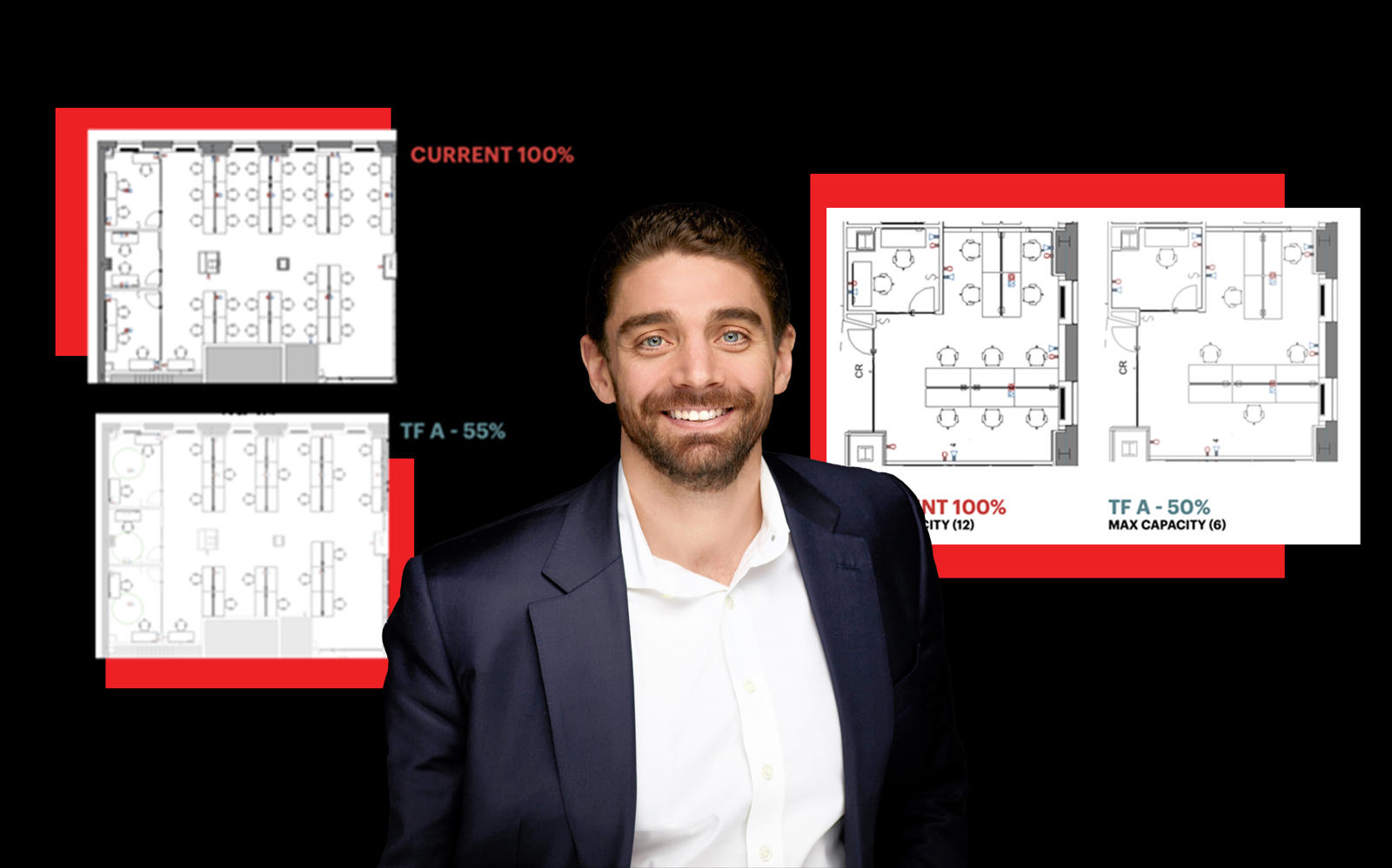For years, co-working and flexible office space firms sold memberships by touting the value of flexibility and community. But with re-opening on the horizon, many view the latter as a liability.
To minimize the risk of shoulder-to-shoulder workspaces, many are overhauling spaces in the age of coronavirus.
Earlier this month, Convene said it would reduce office capacity by 50 percent to allow workers to maintain social distancing. Industrious will keep communal areas closed for the first six weeks. And Bond Collective will limit the number of people allowed in conference rooms. Serendipity Labs has launched a subscription program that is interchangeable between members and locations to help companies ease workers back to office work.
“There’s no panacea or silver bullet,” said Amy Pooser, Convene’s global chief operating and chief people officer. “We had to come up with a safety-net approach.”
Since March, when states enacted stay-at-home orders, shared office firms have struggled with lost revenue and vacancies. Knotel, Convene and Industrious all laid off and furloughed staff. WeWork, already grappling with heavy financial losses, faced scrutiny over a decision to remain open (and collect fees) during the pandemic.
A few weeks ago, it became clear that if people were to return to work, spaces would need to be overhauled. “We’re going to have to redesign everything,” Knotel CEO Amol Sarva said last month during a virtual panel hosted by Savills.
Convene was among the first to go public with plans that will drastically reduce the number of people at each of its locations. Desks that normally seat six will seat three; members will have designated chairs and desks. Architects and designers have redrawn spaces and are preparing to yank extra furniture, Pooser said.
In addition to de-densification, she said Convene has mapped out other physical and programmatic changes. They include daily temperature checks; near-continuous cleaning of certain high-touch areas; and boxed lunches instead of family-style catering. (Convene offers catering to businesses located in buildings that it occupies.) “This will be some of the safest food out there,” Pooser said. She said the space redesign, including floor markings, will ensure members “will absolutely be able to and have to adhere to the six-foot rule.”
Co-working and flex space firms aren’t alone in rethinking the future of office space, with some major companies questioning the value of bricks-and-mortar altogether. “We’re proven we can operate with no footprint,” James Gorman, CEO of Morgan Stanley, told Bloomberg in mid-April.
Last week, Twitter CEO Jack Dorsey told employees they can work from home permanently. With “very few exceptions,” the company won’t open any of its offices until September. “If our employees are in a role and situation that enables them to work from home and they want to continue to do so forever, we will make that happen,” a representative from the company said in an email.
But not everyone’s so sure. Marc Holliday, CEO of SL Green Realty, New York City’s largest office landlord, said during an earnings call this month that “work from home has proven serviceable at best.”
“Count me out as someone who believes that [the] future of work will be at home in a bedroom with a laptop computer and spotty Wi-Fi connections,” he added.
To accommodate companies moving workers back to the office, Serendipity Labs this month introduced a “transitional workplace” subscription. CEO John Arenas said the cost is fixed at $299 per month for a desk at any of its 39 locations, which began re-staffing this month in compliance with local rules.
Serendipity Labs is selling subscriptions during the month of May, and desks are transferable between members and locations.
Arenas said several corporate customers reached out seeking flex space because they are reducing their own office density. “Our industry should be equipped to solve for this transition,” he said.
Subscriptions also represent a new line of revenue for the company, and possibly a way to fill vacant inventory. “We’re helping to ride this accelerated movement toward flexibility and working remotely to win customers,” according to Arenas. With a massive shift to working-from-home during the pandemic, he said the notion of “workplace” has become a continuum. “It’s not a binary thing,” he said. “It’s, ‘where do I want to work today based on what I need to do and who I need to see.’”
To compensate for having fewer members on site, Convene said it’s converting some meeting spaces into workspace. It’s also lowering staffing levels (since there will be fewer members anyway), and testing new programs, including an expanded virtual and hybrid meeting service. “We did the first virtual meeting in 2010, so we’ve always done it,” said Pooser.
Several companies acknowledged that it’s still unclear how many members will return, which could help de-densification efforts. “Every customer we talk to is assuming it will be a while — or never — before we’re going back to everyone coming to the office at the same time,” said Jamie Hodari, CEO of Industrious.
The flex office company, which is in 50 cities, will re-open in phases while putting in place “extreme restrictions,” he said, including temperature checks and mandatory masks. Desks will be six feet apart, hallways will be one-way only and “choke points,” where people tended to congregate, will be restructured.
Hodari said Industrious decided that communal areas will be closed for the first six weeks, and the company is installing lights on conference rooms to indicate whether a room is clean and ready for use (green) or needs to be sanitized (red).
Shlomo Silber, co-founder of Bond Collective, also said he expects members to trickle back slowly. “I don’t think we’ll see people come back in droves,” he said.
Bond will distribute reusable face masks to members and limit the number of people in common areas and conference rooms. But Silber said there are thorny questions to consider, such as whether Bond has the authority to limit the number of people working in a private office. “We’re going back and forth on whether we can tell a company, ‘Hey, you can have five desks, not 15 desks.’”
Read more


